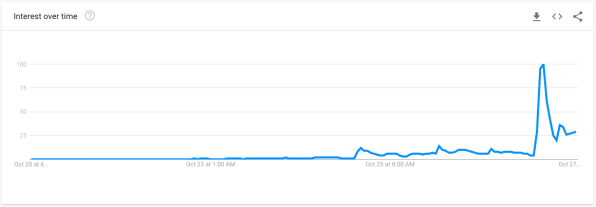‘Can I change my vote’ trending? Yes, Google showed searches for it, but don’t read too much into it
President Trump, long obsessed with TV ratings, is pivoting to online metrics.
Is he right? Leaving aside for a moment the reason why people might be searching how to change their vote, let’s first look at the claim that the term was “strongly trending.” Google Trends data do show an increase in search interest for “change my vote” that began on October 22, the day of the last presidential debate between Trump and former vice president Joe Biden, but whether or not it was a spike depends on how you measure it.
The thing to know about Google Trends is that the data are relative to a specific time period. So if you looked up search interest in “change my vote” last week, you might have seen a spike on the day of the debate or the day after. Some blogs and Reddit posts pointed this out last week, and news outlets picked it up and ran with it.
But those spikes don’t represent absolute search volume. Google indexes the data on a scale of 1 to 100, and last week’s data were based on searches up until that point, measured against wherever you started the search parameters. If you look at the same term again this week, you’ll see last week’s spike all but disappears, probably because after the media wrote it—and then Trump tweeted about it—that fed the cycle of more and more search interest.

Indeed, if you start searching “can I change my vote” in Google right now, you’ll see that the word “trending” appears in the autocomplete suggestions, indicating that some people searching for it are just curious about all this chatter.

Google declined to comment on Trump’s tweet or what’s been driving these searches.
This gets us back to the question of why people are searching this term. It’s a long-winded way of saying that Google Trends data are a great window into what people are interested in, but it’s one of many data points and shouldn’t be seen as a substitute for polling data or even TV ratings, and it’s especially not the same as counting actual votes. Google itself admits this in its own explanation of what Google Trends measures—and what it doesn’t.
(54)



